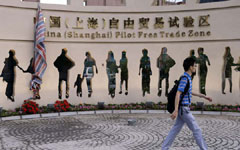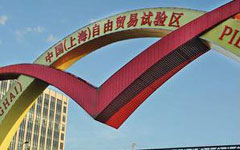SHANGHAI -- The Shanghai free trade zone (FTZ) relaxed barriers to cross-border capital flow on Friday, giving banks and firms in the zone greater freedom in foreign exchange.
Multinationals can open international and domestic accounts to handle foreign exchange transactions. Foreign capital can transfer freely between the international account and offshore accounts. Domestic accounts are still restricted.
 |
 |
The amount of foreign capital allowed to move into the rest of China from the FTZ is determined by the consolidated quota of foreign debt shared by various entities under the same company. Authorities have taken a cautious approach against capital poring out of the free trade zone for fear that speculative money cause problems for the largely closed financial sector.
The program also entails consolidated netting between a company's onshore and offshore entities, thus significantly reducing the number of transactions and associated costs.
The State Administration of Foreign Exchange (SAFE) started a similar trial in late 2012 to allow firms to manage their foreign exchange more efficiently and decided to expand the trial across the nation on June 1 this year.
The People's Bank of China, the central bank, gave the go-ahead in February for the two-way cross-border flow of the yuan in the zone to meet working capital needs.
The FTZ was established to better open the Chinese economy and is used to test financial measures that authorities would like to roll out across the country.
"Underlying these new policies is active communication between policy makers and banks," said Jerry Zhang, Standard Chartered's China CEO. "Both regulators and banks contributed their share to moving policy forward. We tell regulators the needs of our clients hoping that they will consider companies' real needs when formulating policies."
